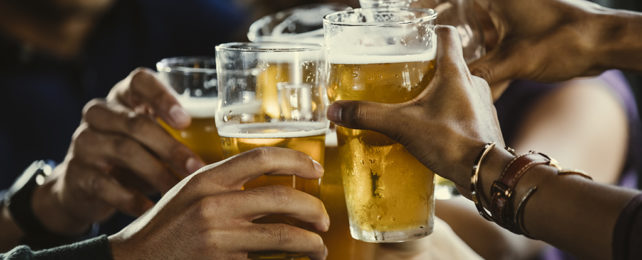Imagine quickly reducing the effects of drunkenness or alcohol poisoning with a single jab: that's the premise of new research in mice, using the hormone fibroblast growth factor 21 (FGF21) as the treatment.
It seems that FGF21 increases alertness in the brain, fighting against certain effects of intoxication – such as drowsiness and a lack of coordination – without fundamentally changing how alcohol is broken down in the body.
The liver produces the hormone in both mice and humans, suggesting these results could apply to us, too. Ultimately, it could be used to rouse people suffering from alcohol poisoning or extreme drunkenness so that they could be better treated.
"We've discovered that the liver is not only involved in metabolizing alcohol but that it also sends a hormonal signal to the brain to protect against the harmful effects of intoxication, including both loss of consciousness and coordination," says molecular biologist Steven Kliewer from the University of Texas Southwestern Medical Center.
"We've further shown that by increasing FGF21 concentrations even higher by injection, we can dramatically accelerate recovery from intoxication. FGF21 does this by activating a very specific part of the brain that controls alertness."
Plenty of previous studies have looked into the effects of FGF21, which can start being produced by various triggers, including the consumption of ethanol, the intoxicating ingredient in alcohol.
It appears to be a defense against drunkenness: It's been shown to stimulate water drinking and suppress a desire for further ethanol consumption.
In this new study, researchers note that mice bred so they wouldn't naturally produce FGF21 took longer to recover their balance and righting reflex (correcting the body's orientation) after boozing.
What's more, when mice that produced FGF21 naturally were given a course of ethanol and then an extra injection of the hormone, they recovered their coordination and consciousness twice as fast as the mice that didn't get the additional shot.
Further analysis showed that FGF21 was affecting a specific brain region called the locus coeruleus. This brain region produces noradrenaline, a neurotransmitter linked to the fight-or-flight response and regulations alertness and sleep arousal.
"Our studies reveal that the brain is the major site of action for FGF21's effects," says pharmacologist David Mangelsdorf from the University of Texas Southwestern Medical Center.
"We are now exploring in greater depth the neuronal pathways by which FGF21 exerts its sobering effect."
Interestingly, the FGF21 hormone didn't have the same restorative effects when tested with ketamine, diazepam, or pentobarbital in the study. This suggests that it's specifically countering ethanol.
While mice don't have bars to visit, they can snack on sugary foods containing ethanol. It's possible that FGF21 has evolved to help them and other animals curtail the desire to consume too much alcohol at once, protecting them against alcohol-induced liver damage.
These effects still need to be demonstrated in humans as well, of course, though the researchers are confident that the same processes will occur and that it could be used as a method of starting some of the sobering up process.
"These results suggest that this FGF21 liver-brain pathway evolved to protect against ethanol-induced intoxication and that it might be targeted pharmaceutically for treating acute alcohol poisoning," write the researchers.
The research has been published in Cell Metabolism.
